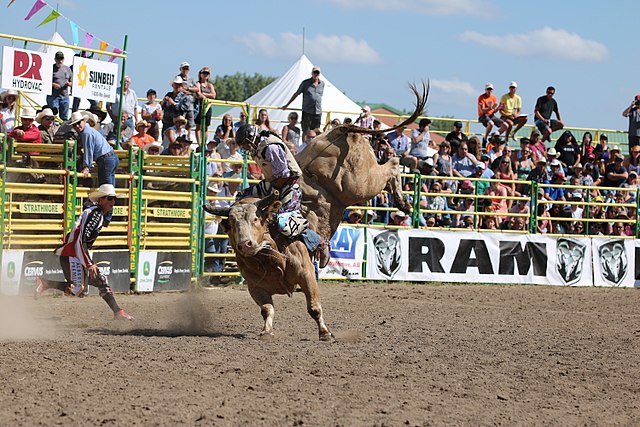Professional Bull Riding: The Growing American Sport Sparking Countless Moral Debates
January 27, 2023
Eight seconds. This amount of time has become the benchmark for many Americans to make some extra cash. Yet across countless small towns in the American South and West, 8 seconds means so much more. It can mean the difference between life and death, a win or a loss, and pride and disappointment. It means the title of a cowboy.
A tradition that is as old as this nation, rodeo and bull riding has become synonymous with everything that is American. However, over the past two decades questions have been raised on whether rodeo is ethical in a society that is increasingly valuing health and safety in sports.
It’s a Monday night over Christmas break as I walk into my living room. As an avid football fan, I have one eye locked on the Bengals-Bills game, where the number one seed of the AFC can be decided depending on who wins the game. However, this game was not like any other game I have seen. I watched in shock as players huddled around Damar Hamlin, a Buffalo Bills safety, who had collapsed horribly on the field after a crunching tackle. Yet, as the internet exploded in support for the star safety and questions were raised everywhere on how such a thing could possibly happen in today’s league, I kept harkening back to another type of sport that had always captured my attention.
I remembered earlier that day, while watching the highlights from the Professional Bull Riding (PBR) Elite Series in Albany that weekend, I grimaced as many cowboys were bruised, tossed, and pummeled by massive two ton bulls. In fact, one of my favorite cowboys to watch, Rafael Jose de Brito, was tossed and attacked in mid-air by his bull, all while not wearing a helmet. In World Championship Bull Riding, riders are not required to wear helmets if born before the year of 1994. De Brito, one of the few “rodeo veterans” that have made it in a sport where making it past the age of 30 is a rarity, only rides with his Stetson hat and his PBR required zip up vest. However dangerous it might be, De Brito has found success in rodeo and is currently ranked number #5 in the world.
Cowboys have been some of the most adored figures in Hollywood history, with characters like John Wayne and Clint Eastwood becoming larger than life in American lore. In fact, that is still shown in today’s television, with Kevin Costner’s led western Yellowstone being the most watched show in America in 2022 by a mile. All of these factors have romanticized the American west and its pastimes, including the sport of rodeo. However, many of the cowboys who have been born and bred within the sport don’t appreciate the increase of its popularity In the age where blue collar lives are becoming less valued in an American capitalized society, cowboys like J.B Mauney have stood strong in their belief that bull riding should go hand in hand with actual cowboys. In an interview with VICE, Mauney stated that, “As bull riding gettin’ to be a bigger sport, it’s starting to become more mainstream: generation I see now are gettin’ farther and farther away from being cowboys. It’s goin’ outta style cause it’s a different age.”
His sentiment is echoed by many across the nation, yet it’s hard to stop a wheel that’s already turning. With a bigger audience, it’s possible for more folks to see things like the 3-4 deaths a year that the PBR association experiences on average. Veterans of the game like De Brito and Mauney may have experienced success at the top of their field, yet even their prowess has not given them immunity from horrific injury. Mauney, the 2 time PBR World Champ and who is often considered as one of (if not the) greatest bull riders of time, has broken his jaw, lost many teeth, broken both legs, torn his MCL and ACL, and also broken his back twice.
As I watched the Duluth edition of the PBR World Tour this weekend, I couldn’t help but feel a little uneasy about what I was doing. Was it okay for me to enjoy a sport where human life is so easily lost in the blink of an eye? Or was the pure romantic and emotional value of such a vital sport in understanding the history of American culture more important in the grand scheme of things.
